-
Japan awards tsunami buoy contract to SAIC
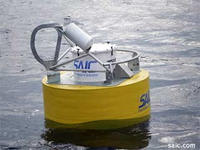
The Japan Meteorological Agency (JMA) in Tokyo, Japan, has awarded (SAIC) a contract for the production and delivery of six SAIC Tsunami Buoy (STB) systems; the STB systems will be deployed at locations in the northwest Pacific Ocean approximately 200 nautical miles east of Sendai, Japan
-
-
Heat waves move toward California coasts, become more humid, imperiling health
Scientists detected a trend toward more humid heat waves which are expressed very strongly in elevated nighttime temperatures, a trend consistent with climate change projections; moreover, relative to local warming, the mid-summer heat waves are getting stronger in generally cooler coastal areas; this carries strong public health implications for the twenty-one million Californians living near the ocean whose everyday lives are acclimated to moderate temperatures
-
-
Smart agriculture will increase global food production, reduce environmental impact

Global demand for food is expected to double by 2050 due to population growth and increased standards of living; a new study, based on analysis of agricultural data gathered from around the world, offers hope that with more strategic use of fertilizer and water, we could not only dramatically boost global crop yield, but also reduce the adverse environmental impact of agriculture
-
-
Last year’s east coast earthquake has the region preparing for another one
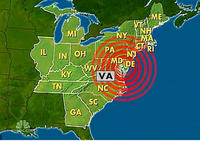
Last year an earthquake that was centered in Virginia shook up the entire east coast, surprising everyone; it did not result in any deaths and was considered relatively light compared to many tremors on the West Coast, but it was bad enough to force some states to prepare themselves in case of another quake
-
-
Activists in arms over plans to ship plutonium to New Mexico
A proposal to ship tons of plutonium to New Mexico, including cores of nuclear warheads which would be dismantled at a structurally questionable lab on top of an earthquake fault zone, has activists and nuclear watchdogs up in arms
-
-
Los Alamos lab responds to radiological incident
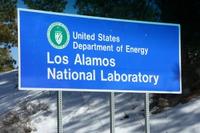
The Los Alamos National Laboratory said it is investigating the inadvertent spread of Technetium 99 by employees and contractors at the Lujan Neutron Scattering Center at the Los Alamos Neutron Science Center (LANSCE), a multidisciplinary accelerator facility used for both civilian and national security research; multiple tests indicate no health risks to public or employees
-
-
Near-instantaneous DNA analysis
Polymerase chain reaction (PCR) is an indispensible technique allowing researchers and clinicians to produce millions of copies from a single piece of DNA or RNA for use in genome sequencing, gene analysis, inheritable disease diagnosis, paternity testing, forensic identification, and the detection of infectious diseases; PCR for point-of-care, emergency-response, or widespread monitoring applications needs to be very fast — on the order of a few minutes; this has now been achieved
-
-
One solution to the aging U.S. grid: microgrids
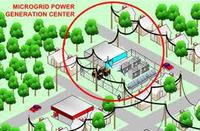
Most Americans do not have to think much about energy reliability; they plug in a computer and it powers up; they flip a switch and the lights come on; while very reliable today, the U.S. electricity grid is old and has gone at least five decades without a significant technological upgrade. The U.S. Department of Energy’s National Renewable Energy Laboratory is working with industry on one solution to help maintain a secure, reliable flow of energy: microgrids
-
-
Cooling coal emissions would clean air, lower health, climate-change costs
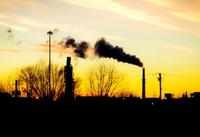
In the United States there are about 1,400 electric-generating unit powered by coal, operated at about 600 power plants; the estimated health costs of burning coal in the United States are in the range of $150 billion to $380 billion, including 18,000-46,000 premature deaths, 540,000 asthma attacks, 13,000 emergency room visits, and two million missed work or school days each year; scientists estimate that implementing large-scale cryogenic systems into coal-fired plants would reduce overall costs to society by 38 percent through the sharp reduction of associated health-care and climate-change costs
-
-
Maldives to build floating islands to save country from rising sea levels
The Maldives Islands, a low-lying chain of twenty-six atolls in the Indian Ocean, are sinking; more precisely: due to global warming, the sea level is rising over the islands, most of which sit lower than three feet above the rising water; the Maldives government has embarked on an ambitious project: build floating islands, anchor them to the ocean floor, then relocate most of the population of 300,000 – and some of the tourist attractions – to them
-
-
New hurricane simulator to help find way to minimize storms’ destruction
Hurricanes in Miami can range from just rain and light wind to shredded houses, overturned cars, massive flooding, and death. Now, almost twenty years after Hurricane Andrew, Florida International University is using a new simulator to find ways to prevent the massive damage a hurricane can create
-
-
Decline and fall: all built structures are destined to break down or fail
A series of infrastructure-related accidents in Ontario this summer has caused people to ask: Just how safe are the structures that we build? The answer a materials science and engineering professor offers may not be reassuring: “Nature always looks for ways to use energy in a favorable state — gravity always pushing things downwards is an example. Any built structure naturally goes against nature. Therefore, all structures will eventually be broken or destroyed — given the right amount of time, they will break down or fail.”
-
-
U.S. risks losing out to Asia in medical research
Medical research saves lives, suffering, and dollars — while also creating jobs and economic activity; the United States has long led the world, with hundreds of thousands of jobs and marketable discoveries generated by government research funding every year; this is now changing: strong, sustained growth in research spending in Asian nations contrasts with U.S. cuts and short-term approach, and a brain drain could result
-
-
Electric plants challenged by high temperatures, drought
The hottest July on record since 1895, along with the most wide-spread drought in the country since 1956, have nuclear plants struggling with finding enough water — cool water — to keep key parts of the plants cool; if the water gets too warm, operators have to dial back production — for reactor safety, and also to regulate the temperature of discharge water, which affects aquatic life
-
-
Glass offers a better way of storing U.K. nuclear waste
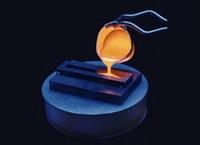
Researchers have shown, for the first time, that a method of storing nuclear waste normally used only for High Level Waste (HLW) could provide a safer, more efficient, and potentially cheaper solution for the storage and ultimate disposal of Intermediate Level Waste (ILW)
-
More headlines
The long view
New Technology is Keeping the Skies Safe
DHS S&T Baggage, Cargo, and People Screening (BCP) Program develops state-of-the-art screening solutions to help secure airspace, communities, and borders
Factories First: Winning the Drone War Before It Starts
Wars are won by factories before they are won on the battlefield,Martin C. Feldmann writes, noting that the United States lacks the manufacturing depth for the coming drone age. Rectifying this situation “will take far more than procurement tweaks,” Feldmann writes. “It demands a national-level, wartime-scale industrial mobilization.”
How Artificial General Intelligence Could Affect the Rise and Fall of Nations
Visions for potential AGI futures: A new report from RAND aims to stimulate thinking among policymakers about possible impacts of the development of artificial general intelligence (AGI) on geopolitics and the world order.
Smaller Nuclear Reactors Spark Renewed Interest in a Once-Shunned Energy Source
In the past two years, half the states have taken action to promote nuclear power, from creating nuclear task forces to integrating nuclear into long-term energy plans.
Keeping the Lights on with Nuclear Waste: Radiochemistry Transforms Nuclear Waste into Strategic Materials
How UNLV radiochemistry is pioneering the future of energy in the Southwest by salvaging strategic materials from nuclear dumps –and making it safe.
Model Predicts Long-Term Effects of Nuclear Waste on Underground Disposal Systems
The simulations matched results from an underground lab experiment in Switzerland, suggesting modeling could be used to validate the safety of nuclear disposal sites.
